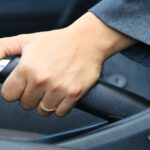Highways serve as crucial arteries of transportation, ensuring the smooth flow of vehicles across vast distances. To ensure the safety and convenience of all road users, specific rules and regulations are put in place. One such regulation is the prohibition of blowing horns at night on highways. It is not a new thing to talk about, because many people often talk about this and tell others not to horn at night while on the road or highways. So, here we are talking about the main reasons behind, why you should not blow the horn at night.
Blowing the horn at night on a highway is generally discouraged for several reasons. Firstly, it is crucial to prioritize the safety and well-being of all road users, including other drivers, pedestrians, and nearby residents. Blaring a horn during nighttime can disturb the tranquility of residential areas, potentially causing discomfort and sleep disruption for people living nearby. And also not only on highways but it is also prohibited to do on the local roads at night. Scroll on to know the real reasons.
Why It Is Probhited To Blow Horn At Night?
Moreover, excessive noise can contribute to an increase in stress levels and pose a hazard to individuals who may be sensitive to loud sounds, such as young children, elderly people, or individuals with certain medical conditions. Additionally, during nighttime, visibility is often reduced, and sudden loud noises can startle drivers, leading to potential accidents or loss of control. Therefore, it is generally advisable to refrain from unnecessary horn usage at night on highways, promoting a peaceful environment and ensuring road safety for everyone. So, below are the explained reasons behind why you should not blow horn at night and what it may lead to.
Noise Pollution and Disturbance
One of the primary reasons for prohibiting horn blowing at night on highways is to mitigate noise pollution. Noise pollution refers to excessive or displeasing sounds that can disrupt the peace and tranquility of an area. Nighttime is usually a period when people are resting and seeking respite from the day’s activities. Unnecessary honking can disturb the sleep of nearby residents, leading to discomfort and potential health issues. Prohibiting horn blowing at night helps in preserving the serenity of the surroundings, ensuring a peaceful environment for residents.
Fatigue and Sleep Deprivation
Fatigue and sleep deprivation are significant factors contributing to road accidents. When drivers are tired or drowsy, their reaction times and judgment can be severely impaired. The sound of a horn can startle a fatigued driver, potentially leading to erratic maneuvers or loss of control. By prohibiting horn blowing at night, authorities aim to minimize the chances of triggering such reactions and prevent accidents caused by drowsy driving.
Wildlife Disturbance
Highways often pass through or near areas that are home to various species of wildlife. Nocturnal animals, in particular, are adapted to the nighttime environment and rely heavily on their senses to navigate and hunt. The loud noise produced by a car horn can disturb and disorient wildlife, affecting their behavior and potentially leading to accidents. By imposing restrictions on horn blowing at night, we aim to minimize the disturbance caused to these animals, preserving their natural habitats and reducing the risk of collisions between vehicles and wildlife.
Sensory Overload and Focus
Driving at night can present unique challenges due to reduced visibility. The absence of natural light and the presence of bright headlights from oncoming vehicles can create sensory overload for drivers. In such conditions, it is crucial for drivers to maintain their focus and concentration on the road ahead. Excessive horn blowing can add to the sensory overload, diverting the attention of drivers from important visual cues and increasing the risk of accidents. Prohibiting horn blowing at night helps in creating a calmer driving environment, allowing drivers to better focus on the road and potential hazards.
Emergency Vehicle Distinction
Emergency vehicles such as ambulances, fire trucks, and police cars rely on sirens and flashing lights to alert other road users of their presence. Blowing horns at night can create confusion, as the sound of a horn may be mistaken for an emergency vehicle’s siren. This can lead to delayed or inappropriate responses from other drivers, potentially hindering the progress of emergency vehicles. By prohibiting horn blowing at night, authorities aim to ensure that the distinctiveness of emergency sirens is maintained, allowing for efficient response times during critical situations.
Highway rules are established to safeguard the well-being of all road users and promote a safe and efficient transportation system. Prohibiting horn blowing at night on highways serves multiple purposes, including reducing noise pollution, preventing disturbances to wildlife, minimizing sensory overload for drivers, and maintaining the distinction of emergency vehicle sirens. By adhering to these regulations, we can create a more harmonious and secure environment for everyone, both on and off the roads. Let us all play our part in making highways safer and more enjoyable for all.






GIPHY App Key not set. Please check settings